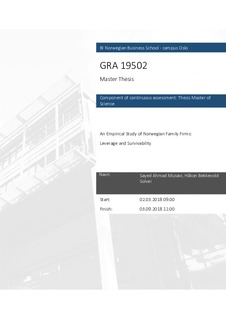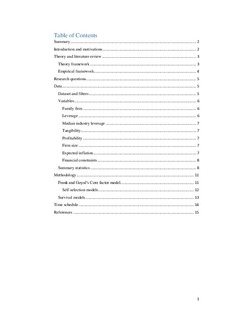| dc.contributor.author | Musavi, Sayed Ahmad | |
| dc.contributor.author | Solvei, Håkon Bekkevold | |
| dc.date.accessioned | 2019-01-10T10:09:50Z | |
| dc.date.available | 2019-01-10T10:09:50Z | |
| dc.date.issued | 2018 | |
| dc.identifier.uri | http://hdl.handle.net/11250/2580149 | |
| dc.description | Masteroppgave(MSc) in Master of Science in Business, Finance - Handelshøyskolen BI, 2018 | nb_NO |
| dc.description.abstract | This master thesis is structured as an empirical research paper on traditional Nor-
wegian family rms, which we de ne as a rm where the controlling family owns at
least 2
3 of the shares. This paper is concerned with the capital structure and surviv-
ability of start-up family rms. We investigated whether family rms prefer a more
conservative capital structure than non-family rms and whether family ownership is
associated with higher probability of survival. We found evidence that family rms
have less debt- nancing and higher probability of survival after controlling for rele-
vant factors. We show that our results are robust across de nitions and time, and
are not a ected by endogeneity issues caused by self-selection bias. We conclude that
the owners of family rms are more conservative in their decision making and that
these characteristics can reduce agency con
icts between shareholders and creditors.
Ownership structure can be an important input in credit evaluation and debt valuation
models of start-up rms' nancing. Hence, this has interesting practical implications
for investors in times where peer-to-peer lending is a growing industry and the rst
lending platforms are launching in Norway. | nb_NO |
| dc.language.iso | eng | nb_NO |
| dc.publisher | Handelshøyskolen BI | nb_NO |
| dc.subject | finans | nb_NO |
| dc.subject | finance | nb_NO |
| dc.title | An Empirical Study of Norwegian Family Firms: Leverage and Survivability | nb_NO |
| dc.type | Master thesis | nb_NO |

